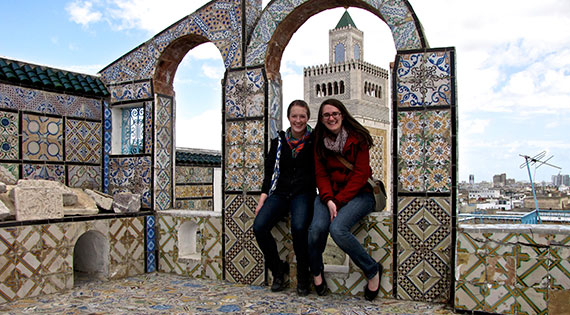║¼ą▀▓▌蹊┐╦∙ students are sharing their experiences conducting research with faculty members on campus and in the field. This post is by peace and conflict studies major Sarah Dickson, of Wayne, Penn.
In January 2011, almost a month after street protests broke out in Tunisia against high unemployment rates and government corruption, the nationŌĆÖs president gave in to protestersŌĆÖ demands and fled the country. The Tunisian revolutionŌĆÖs success is believed to have ignited the regional ŌĆ£Arab SpringŌĆØ movement.
As a major concentrating on the Middle East and North Africa, I was extremely interested in the events happening in Tunisia. And, as someone who has studied French for many years, I was eager to practice my language skills in the French-speaking North African country. So, I set my sights on going to Tunisia.
After convincing my family to let me travel to a post-revolutionary country, I was off to spend the spring 2013 semester studying abroad in Tunis, the capital of Tunisia. After living with an incredibly welcoming Tunisian family and taking courses in Tunisian politics and the French language, my semester culminated with an independent research project.
I met with young Tunisians, many of my host siblingsŌĆÖ friends as well as local university students, and interviewed them about their opinions on voting. My research concluded that after the revolution, youths were excited about and felt free to express their political opinions.
The majority of youths I interviewed felt excited to have voted in the first free election. However, they were disappointed with the party that was elected by a wide margin and are skeptical that voting can create real change in their country, as they view most politicians as self-serving.
When I returned to ║¼ą▀▓▌蹊┐╦∙ for the fall semester, I decided to expand on my research by writing a senior PCON thesis under my advisor, Professor . I am currently trying to answer the question of how young Tunisians express political agency in the post-revolutionary atmosphere, if not through voting.
By analyzing social media posts, blogs, political cartoons, and politically charged rap music, my thesis explores how Tunisian youth have found space outside of the traditional political sphere to express their opinions.
The research I conducted based on in-person interviews with the young Tunisians I met during my semester abroad has added a completely new element of engagement to my PCON studies.
After spending countless hours reading and writing about other scholarsŌĆÖ fieldwork, it is exciting and satisfying to be producing original work on a topic of my own.
ŌĆöSarah Dickson ŌĆś14
